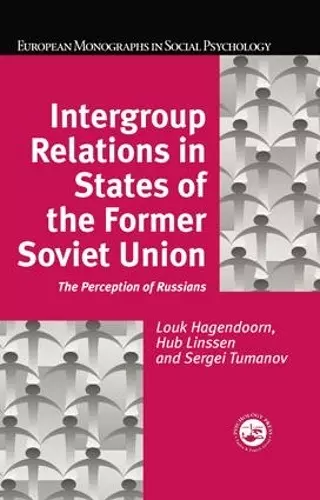Intergroup Relations in States of the Former Soviet Union
The Perception of Russians
Louk Hagendoorn editor Hub Linssen editor Sergei Tumanov editor
Format:Paperback
Publisher:Taylor & Francis Ltd
Published:6th May '16
Currently unavailable, and unfortunately no date known when it will be back
This paperback is available in another edition too:
- Hardback£145.00(9781841692319)

This insightful exploration of identity examines the relationships between ethnic Russians and indigenous populations in the post-Soviet landscape, as discussed in Intergroup Relations in States of the Former Soviet Union.
Exploring the intricate dynamics of identity among Russian peoples, Intergroup Relations in States of the Former Soviet Union delves into the shared perceptions, fears, and nationalism that exist between ethnic Russians and indigenous populations. Following the dissolution of the Soviet Union in 1991, approximately 25 million ethnic Russians found themselves living beyond the borders of the Russian Federation. This book provides a comprehensive examination of their social identity and the complex relationships they maintain with the local 'titular' populations.
Through a unique study that encompasses national surveys conducted across Belarus, Ukraine, Moldova, Georgia, and Kazakhstan, Intergroup Relations in States of the Former Soviet Union identifies key individual, intergroup, and cross-national factors influencing the fears and perceptions of both groups. The book meticulously analyzes how personal and national background factors shape intergroup relations, exploring themes such as mutual stereotypes, social distance, language, and citizenship perceptions. Additionally, it investigates the dynamics of assimilation and separation experienced by Russians in these former Soviet states.
With its detailed statistical analysis and insightful conclusions, this book sheds light on the complexities of intergroup relations. It aims to contribute to a broader understanding of these dynamics within the fields of Psychology, Sociology, and Politics, making it an essential resource for scholars and practitioners alike.
The intellectual level of this project is exceptionally high and a very impressive work has been produced. The authors have come up with important and, occasionally, unexpected findings. This book has pushed back the boundaries of our understanding of interethnic relations in the former Soviet Union. - Richard Sakwa, University of Kent, Canterbury
By its scope alone, this study is interesting. More than that, it is impressive for the sophistication and scholarly rigour with which it deals with the material. As attitudes are measured on several levels, and a complexity of possible causal pathways are explored, the book stays firmly focused. The findings are convincing, policy-relevant and sometimes surprising. The combination of psychological approaches to loyalty, prejudice and conflict with statistical surveys in this case has created a study that very nicely builds on existing social science work on the Russian diaspora. - Journal of Peace Research
This volume could become a major contribution to our understanding of interethnic prejudice and conflict. Its unique data offer the opportunity to test many of the field's leading theories in new intergroup contexts. Thus, it promises to be a significant scholarly work that all major libraries and students of intergroup relations will need on their shelves. - Thomas F. Pettigrew, University of California, Santa Cruz
The intellectual level of this project is exceptionally high and a very impressive work has been produced. The authors have come up with important and, occasionally, unexpected findings. This book has pushed back the boundaries of our understanding of interethnic relations in the former Soviet Union. - Richard Sakwa, University of Kent, Canterbury
By its scope alone, this study is interesting. More than that, it is impressive for the sophistication and scholarly rigour with which it deals with the material. As attitudes are measured on several levels, and a complexity of possible causal pathways are explored, the book stays firmly focused. The findings are convincing, policy-relevant and sometimes surprising. The combination of psychological approaches to loyalty, prejudice and conflict with statistical surveys in this case has created a study that very nicely builds on existing social science work on the Russian diaspora. - Journal of Peace Research
ISBN: 9781138883154
Dimensions: unknown
Weight: 453g
288 pages